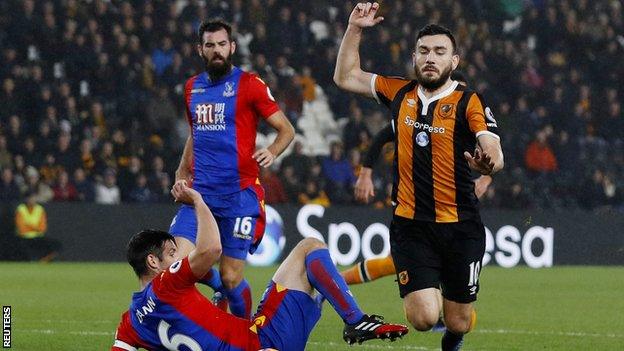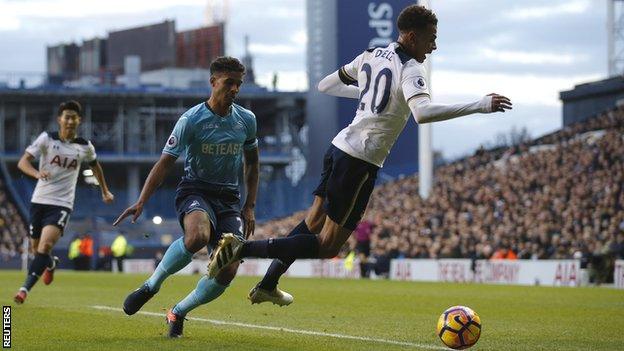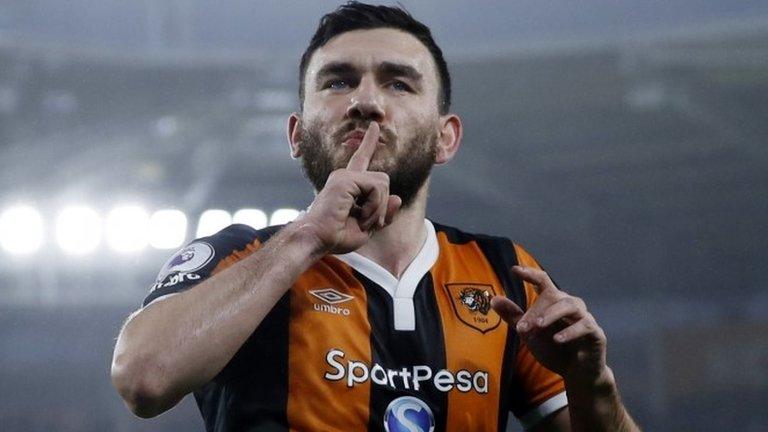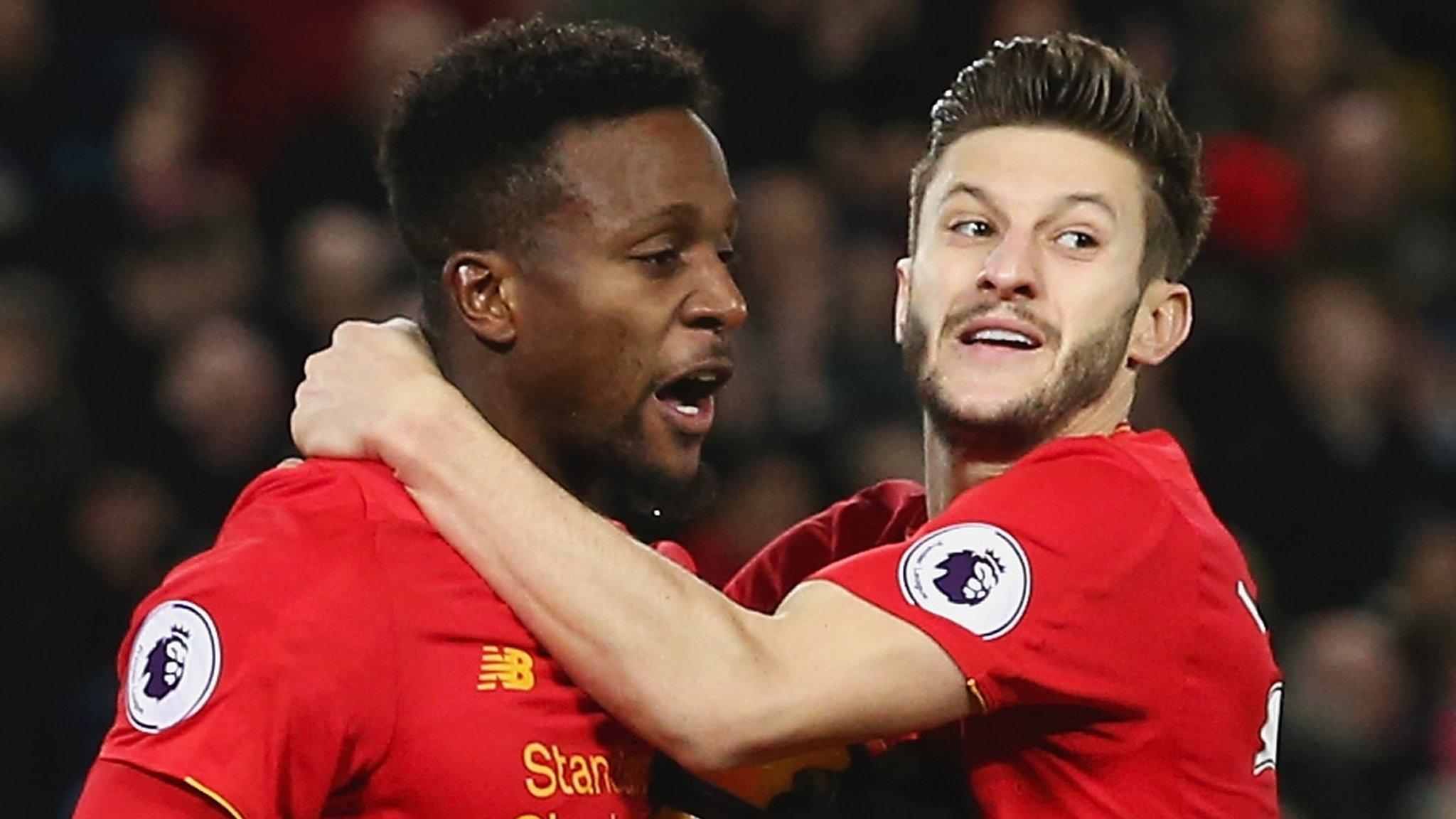Retrospective bans will end diving, says Burnley boss Sean Dyche
- Published

Robert Snodgrass (r) apologised for going down to win a penalty in Hull's draw with Crystal Palace
Burnley boss Sean Dyche believes diving would be eradicated from football "in six months" with retrospective bans.
His comments come after two recent incidents in Premier League matches.
Robert Snodgrass apologised for going down without contact to earn a penalty for Hull against Crystal Palace, while Dele Alli won a debated spot-kick in Tottenham's 5-0 win over Swansea.
"Introduce retrospective bans and it will be gone. I'm stunned it's not been introduced," said Dyche.
"Certain teams would have three or four players done immediately, from a warning in private to the manager up to a three-game ban.
"It's simple to officiate. You have a panel of experts and give out bans.
"Within six months the panel would be defunct because people wouldn't be doing it anymore."
Video technology 'around the corner'
Hull boss Mike Phelan believes it is only a matter of time before video technology is introduced to ensure that correct decisions are made in Premier League games.
"I think video technology is just around the corner," he said.
When asked why, he added: "I think because of the high demand for the correct decisions and because the rewards are so great now.
"We've created this environment now where everything is scrutinised so closely, because it can be, that it's just a matter of time before things are going to be judged in real time."
'Is it clever to cheat? I don't think so.'

Deli Alli's penalty, converted by Harry Kane, sent Tottenham on their way to a 5-0 win against Swansea
Earlier this month, Spurs boss Mauricio Pochettino was quizzed about Alli's penalty against Swansea and said he could not give a "definitive view" about whether the England international had dived while under pressure from Kyle Naughton.
Meanwhile, Snodgrass was already on a yellow card when he won the penalty in the 3-3 draw with Palace at the weekend, and would have been sent off had referee Mike Jones thought he dived and issued a booking for unsporting behaviour.
The Scotland international later tweeted: "Apologies from my end, it was never a penalty. But genuinely thought defender was going to slide, so tried to ride the tackle."
Phelan commended Snodgrass for apologising and said he had spoken to the winger about the incident, but Dyche continued: "It's got to a level now that it is so theatrical that I'm surprised people don't just start laughing.
"It's gone too far. It's ridiculous. There are fans out there who must be tired of seeing it and I'm tired of how it's crept into our game to become accepted.
"My son plays and I can assure you there are kids diving all over the place. That cannot be right. If you caught your kid cheating in a maths test what would you say? You'd go mental, absolutely mental.
"Seemingly in football it's OK if little Johnny dives, it's clever. But is it clever to cheat? I don't think so.
"Kids copy the coloured football boots, the haircuts, the skills, they're going to copy the way they act as well."
What are the rules on diving?
Under current Football Association rules in England, players who pretend to have been fouled should receive a caution for simulation, which comes under the category of unsporting behaviour.
The rules are different in Scotland, where players can be banned for diving retrospectively. At the start of the current season, Hearts' Jamie Walker was handed a retrospective two-match ban for diving to win a penalty against Celtic.
The Scottish FA found him in breach of disciplinary rule 201 as the "simulation caused a match official to make an incorrect decision". The player contested the charge, but the compliance officer's verdict was upheld.
However, incidents of diving are not currently retrospectively punished in English football.
Is diving on the rise?

Data correct as of 11 December 2016
No, it's not. The highest number of yellow cards dished out for diving was 33 in the 2012-13 season - 2.64% of the total for the campaign.
The second highest was 27 (2.13%) in 2008-09.
This season, there have been eight bookings for diving - 1.28% of the total of 623 yellow cards. That ratio would be the second lowest since 2007-08 if it continues.
Your views
We asked Match of the Day Facebook followers, external for their views on what was the best and worse things about British football. Here are the responses on the subject of diving:
Joshua Thomas: Bans and fines have no impact. If you want to see it stopped (and I do) then take three points off a team where video replays show a player has dived and cheated to try and con the referee. Alli last week, Snodgrass this week. Neither came under any contact. Take three points off Spurs and Hull and I guarantee the managers will put a stop to it within a week.
Sam Cope, in response: As much as I hate diving, a punishment like this would be crazy, and would just lead to massive appeal situations that would on go for weeks.
Andrew Bates: Straight red for diving. If a keeper touches a striker he's off so it should be the same for a striker trying to get a penalty. If it's not caught in the game and brought up after, then a red card should be applied as well.
Timothy Cormack: Give each manager two calls per half. If a manager sees a ref has got a decision wrong, he can challenge the decision. If the manger gets the challenge right he gets to keep the call and the decision is made there and then. If he gets it wrong he loses that challenge.
- Published10 December 2016

- Published11 December 2016
